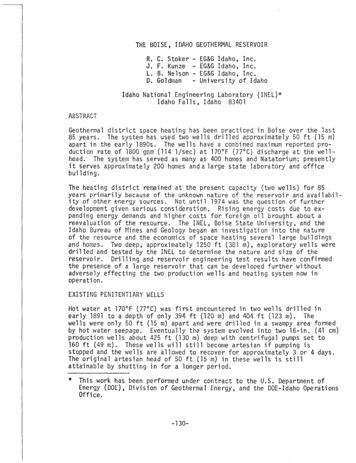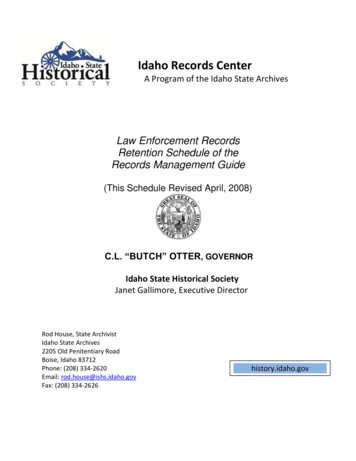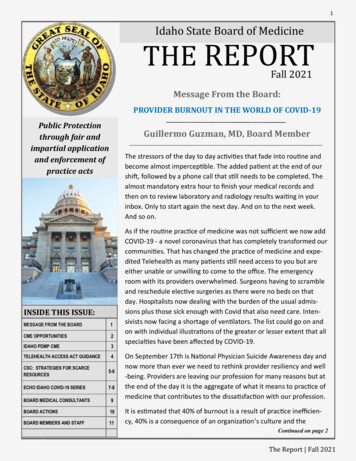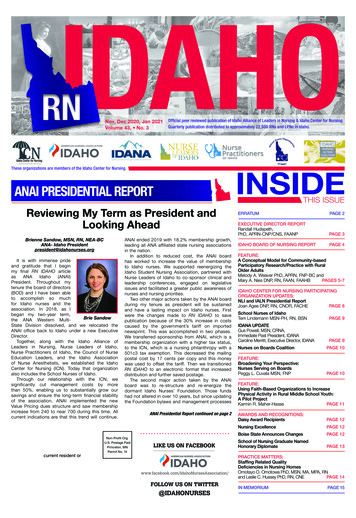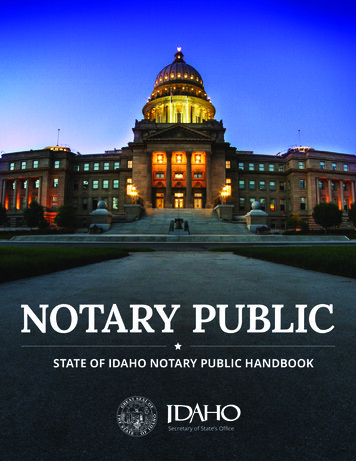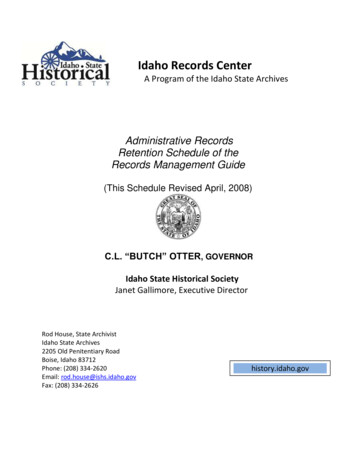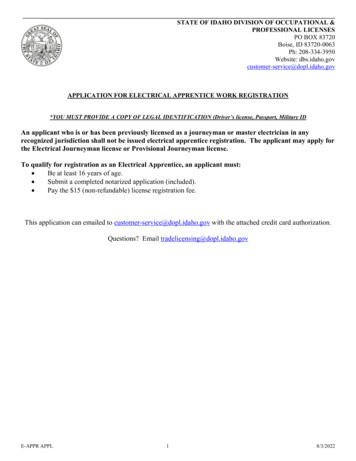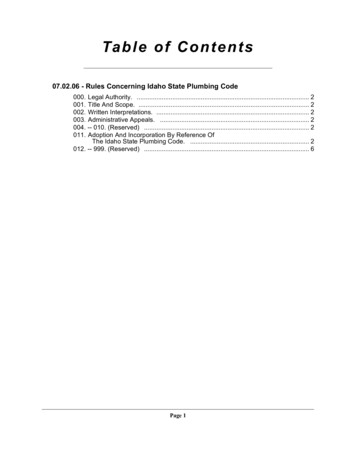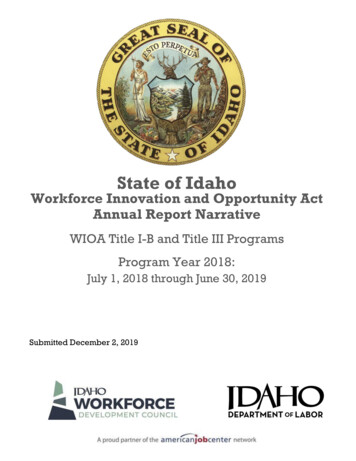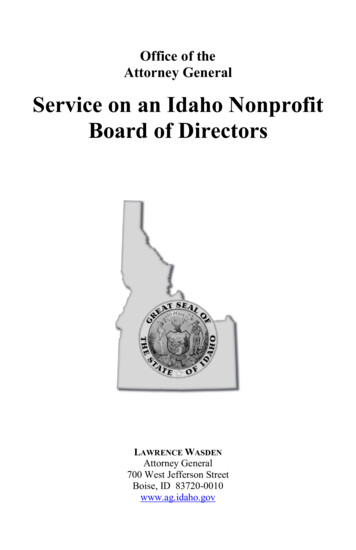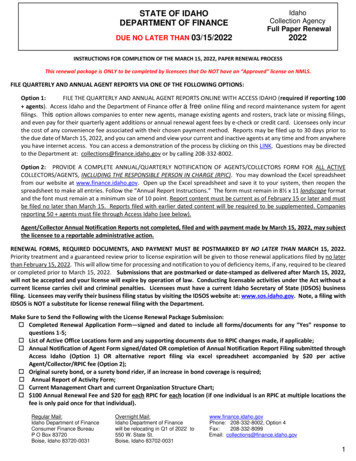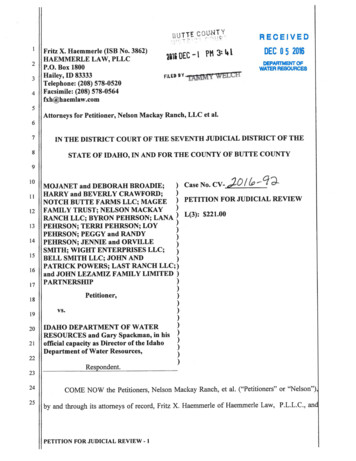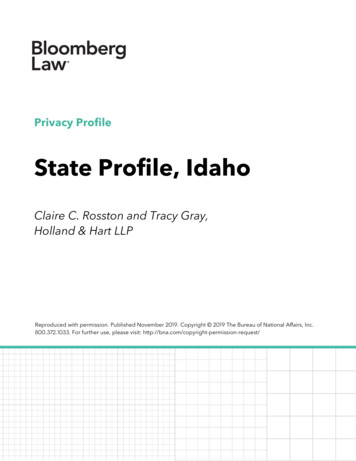
Transcription
Privacy ProfileState Profile, IdahoClaire C. Rosston and Tracy Gray,Holland & Hart LLPReproduced with permission. Published November 2019. Copyright 2019 The Bureau of National Affairs, Inc.800.372.1033. For further use, please visit: http://bna.com/copyright-permission-request/
State Profile, IdahoClaire C. Rosston and Tracy Gray, of Holland & Hart LLP, provided expert review of theIdaho Profile and wrote the Risk Environment section.I. APPLICABLE LAWS AND REGULATIONSA. Constitutional Provisions —There are no constitutional provisions in Idaho conferring a general right of privacy on Idaho residents.B. Personal Data Protection Provisions —The primary privacy and data security law in Idaho is the state's data breach notification law (Idaho Code § 28-51-104through Idaho Code § 28-51-107), which is outlined below and discussed in detail at Section I.C.8.There are additional privacy laws in Idaho, including laws governing security freezes (see Section I.D.4.), electronicsurveillance (see Section I.F.), and identity theft (see Section I.G.2.). Finally, laws related to privacy and data securityapplicable to specific sectors, such as health care, insurance, and employment, are set forth in the portions of this profilededicated to those sectors.1. Who is covered? —The data breach notification law applies to any resident of Idaho whose personal information was or is reasonably believedto have been misused (Idaho Code § 28-51-105(1)).2. What is covered? —The data breach notification law requires a city, county, or state agency, an individual, or a commercial entity conductingbusiness in Idaho and owning or licensing computerized data that includes personal information about Idaho residents toconduct an investigation, upon becoming aware of a breach of the security of the system, to determine the likelihood thatpersonal information has been or will be misused, and on finding such misuse or potential misuse, to notify affected Idahoresidents (Idaho Code § 28-51-105(1)). In addition, an agency, individual, or commercial entity that maintains computerizeddata containing personal information that it does not own or license must give notice to and cooperate with the owner orlicensee of the information of any breach of the security of the system immediately following discovery of a breach if misuseof personal information of an Idaho resident has occurred or is likely to occur (Idaho Code § 28-51-105(2)). For specificinformation on breach notification requirements, see Section I.C.8.3. Who must comply? —The data breach notification law applies to all city, county, or state agencies, individuals, and commercial entities thatconduct business in Idaho and own or license computerized data that includes personal information about an Idahoresident (Idaho Code § 28-51-105(1)). A “commercial entity” includes a corporation, business trust, estate, trust, partnership,limited partnership, limited liability partnership, limited liability company, association, organization, joint venture, or anyother legal entity, whether for profit or not for profit (Idaho Code § 28-51-104(3)).C. Data Management Provisions1. Notice & Consent —Data breach notification: For information on notice requirements under the state's data breach notification requirements,see Section I.C.8.Electronic surveillance: For information on consent requirements regarding the recording of telephone conversations inIdaho, see Section I.F.Bloomberg Law2 2019 The Bureau of National Affairs, Inc.
2. Collection & Use —Insurance and health provisions: Idaho insurance laws and regulations governing the privacy of nonpublic personalinformation of consumers contain provisions regarding collection and use of such information (see Section I.E.7.). Inaddition, provisions of Idaho law governing specific types of health care facilities and providers and health data containrequirements regarding collection and use of such data (see Section I.D.9.).SDATAA: Under the state's Student Data Accessibility, Transparency and Accountability Act (SDATAA), the Department ofEducation is required to develop policies for school districts and public charter schools governing data collection and use(see Section I.E.2.).3. Disclosure to Third Parties —Insurance and health provisions: Idaho insurance laws and regulations governing the privacy of nonpublic personalinformation of consumers contain provisions regarding the disclosure of such information (see Section I.E.7.). In addition,provisions of Idaho law governing specific types of health care facilities and providers and health data contain requirementsregarding disclosure of such data (see Section I.D.9.). Finally, laws governing children's mental health services containspecific requirements regarding disclosure of treatment information to parents or others (see Section I.D.12.).Records not subject to disclosure under Public Records Act: A variety of specified records are not subject to disclosureunder the Idaho Public Records Act, including records exempt from disclosure under state or federal law or federalregulations, or records contained in court files not subject to disclosure under the rules of the Idaho Supreme Court (IdahoCode § 74-104); law enforcement and investigatory records, evacuation and emergency response plans, and worker'scompensation records (Idaho Code § 74-105); and various personnel records, health records, and other records containingpersonal information (Idaho Code § 74-106). For a comprehensive discussion of the Public Records Act, see Section I.C.10.SDATAA: Under the state's Student Data Accessibility, Transparency and Accountability Act (SDATAA), certain disclosuresof student data are prohibited, and the Department of Education is required to develop policies for school districts andpublic charter schools governing disclosures (see Section I.E.2.).4. Data Storage —Our research has revealed no general Idaho law provisions governing privacy and security requirements regarding datastorage. Under the state's Student Data Accessibility, Transparency and Accountability Act (SDATAA), files, documents,images, or data containing a student's educational record that are stored in or transmitted through a cloud computingservice are defined as “student data” subject to the law's requirements (Idaho Code § 33-133(1)(j)(i)(12); see Section I.E.2.).5. Access & Correction —Insurance and health provisions: Idaho insurance laws and regulations governing the privacy of nonpublic personalinformation of consumers contain provisions regarding access and correction of such information (see Section I.E.7.). Inaddition, provisions of Idaho law governing specific types of health care facilities and providers and health data containrequirements regarding access and correction of such data (see Section I.D.9.). Finally, laws governing children's mentalhealth services contain specific requirements regarding access to and correction of treatment records (see Section I.D.12.).SDATAA: Under the state's Student Data Accessibility, Transparency and Accountability Act (SDATAA), the Department ofEducation is required to develop policies for school districts and public charter schools governing access to and correctionof student data (see Section I.E.2.).Access and correction of records subject to Public Records Act: A person whose information is contained in a recordotherwise subject to the Public Records Act's restrictions on disclosure may generally access such records and requestcorrection of inaccurate items under specified statutory conditions (see Section I.C.10.).6. Data Security —SDATAA: Under the state's Student Data Accessibility, Transparency and Accountability Act (SDATAA), the Department ofEducation is required to develop policies for school districts and public charter schools governing the security of studentdata (see Section I.E.2.).Bloomberg Law3 2019 The Bureau of National Affairs, Inc.
Managed care programs: All managed care programs performing utilization management must adopt proceduresdesigned to protect the confidentiality of patient health records. The law restricts recordings of telephone conversationsin the course of requesting medical information only in compliance with state and federal law and with patient notificationof the recording (Idaho Code § 41-3930(1)(d)).7. Data Disposal —SDATAA: Under the state's Student Data Accessibility, Transparency and Accountability Act (SDATAA), the Department ofEducation is required to develop policies for school districts and public charter schools governing the security of studentdata that include data retention and disposition policies (see Section I.E.2.).8. Data Breach —Idaho's data breach notification law (Idaho Code § 28-51-104 through Idaho Code § 28-51-107) outlines the procedures thatagencies, individuals, and commercial entities must follow in providing notice of a data breach to Idaho residents. Therequirements are outlined in detail below.Primary definitions: A “breach of the security of the system” is the illegal acquisition of unencrypted computerized datathat materially compromises the security, confidentiality, or integrity of personal information for one or more personsmaintained by an agency, individual, or commercial entity. Good faith acquisition of personal information by an employeeor agent of an agency, individual, or commercial entity for the purposes of the agency, individual, or entity is not considereda breach of the security of the system, provided the information is not used or subject to further unauthorized disclosure(Idaho Code § 28-51-104(2)). A “commercial entity” is defined as a corporation, business trust, estate, trust, partnership,limited partnership, limited liability partnership, limited liability company, association, organization, joint venture, or anyother legal entity, whether for profit or not for profit (Idaho Code § 28-51-104(3)).“Personal information” is defined as an Idaho resident's first name or first initial and last name in combination with any oneor more of the following data elements, when either the name or data elements are not encrypted: social security number; driver's license number or Idaho ID card number; or account number or credit or debit card number, in combination with any required security code, accesscode, or password that would permit access to a resident's financial account.The term does not include publicly available information that is lawfully made available to the general public from federal,state, or local government records or widely distributed media (Idaho Code § 28-51-104(5)).The term “primary regulator,” for commercial entities or individuals licensed or chartered by the United States, is the entity'sor individual's primary federal regulator. For individuals or entities licensed at the state level, the primary regulator is theDepartment of Finance for licensees of that department, the Department of Insurance for licensees of that department,and the Attorney General for all agencies and all other licensees (Idaho Code § 28-51-104(6)).Notification requirement: A city, county, or state agency, an individual, or a commercial entity conducting business inIdaho and owning or licensing computerized data that includes personal information about Idaho residents must, onbecoming aware of a breach of security of the system, conduct in good faith a reasonable and prompt investigation todetermine the likelihood that personal information has been or will be misused. If the investigation determines that themisuse of information has occurred or is reasonably likely to occur, the agency, individual, or commercial entity must givenotice as soon as possible to the affected Idaho resident. Notice must be made in the most expedient time possible andwithout unreasonable delay, consistent with the legitimate needs of law enforcement (see below) and consistent with anymeasures necessary to determine the scope of the breach, to identify the individuals affected, and to restore the reasonableintegrity of the computerized data system (Idaho Code § 28-51-105(1)). In addition, an agency, individual, or commercialentity that maintains computerized data containing personal information that it does not own or license must give noticeto and cooperate with the owner or licensee of the information of any breach of the security of the system immediatelyfollowing discovery of a breach if misuse of personal information of an Idaho resident has occurred or is likely to occur.Cooperation includes sharing information relevant to the breach with the owner or licensee (Idaho Code § 28-51-105(2)).Bloomberg Law4 2019 The Bureau of National Affairs, Inc.
If an agency becomes aware of a breach of the security of the system, it must, within 24 hours of discovery, notify theAttorney General of the breach. This requirement does not relieve any agency of its obligation to report a security breachto the Office of the Chief Information Officer of the Department of Administration under Idaho technology authority policies(Idaho Code § 28-51-105(1), second paragraph).Notice required as outlined above may be delayed if a law enforcement agency determines that notification will impede acriminal investigation. Notice must be made in good faith, without unreasonable delay, and as soon as possible after thelaw enforcement agency determines that notification will no longer impede the investigation (Idaho Code § 28-51-105(3)).Form and content of notice: The required notice as outlined above includes written notice, telephonic notice, electronicnotice if consistent with federal provisions regarding electronic records and signatures, or substitute notice (Idaho Code §28-51-104(4)). Substitute notice is allowed if the agency, individual, or commercial entity demonstrates that the cost ofproviding notice would exceed 25,000; the number of Idaho residents to be notified exceeds 50,000; or the agency,individual, or commercial entity does not have sufficient contact information. Substitute notice consists of any two of thefollowing: e-mail notice if the agency, individual, or commercial entity has e-mail addresses for the members of theaffected Idaho residents; conspicuous posting of the notice on the agency's, individual's, or entity's website if one is maintained;and notice to major statewide media (Idaho Code § 28-51-104(4)(d)).Exceptions: An agency, individual, or commercial entity that maintains its own notice procedures as part of an informationprivacy or security policy for the treatment of personal information that are otherwise consistent with the timingrequirements of the breach notification law outlined above is deemed to be in compliance if the individual or entity notifiesaffected Idaho residents in accordance with its policies in the event of a breach of the security of the system (Idaho Code§ 28-51-106(1)). An individual or commercial entity that is regulated by state or federal law and that maintains proceduresfor a breach of the security of the system pursuant to the laws, rules, regulations, guidances, or guidelines established byits primary or functional state or federal regulator is deemed to be in compliance if the individual or commercial entitycomplies with such maintained procedures when a breach occurs (Idaho Code § 28-51-106(2)).Violations: A violation of the data breach notification requirements may be enforced in a civil action by the primaryregulator of an agency, individual, or commercial entity seeking injunctive relief and fines (see Section II.C.).Criminal penalties applicable to governmental employees: Any governmental employee who intentionally disclosespersonal information not subject to disclosure otherwise allowed by law is guilty of a misdemeanor punishable by a fine ofnot more than 2,000, imprisonment for up to one year, or both (Idaho Code § 28-51-105(1), third paragraph).9. Data Transfer & Cloud Computing —SDATAA: Under the state's Student Data Accessibility, Transparency and Accountability Act (SDATAA), files, documents,images, or data containing a student's educational record that are stored in or transmitted through a cloud computingservice are defined as “student data” subject to the law's requirements (Idaho Code § 33-133(1)(j)(i)(12); see Section I.E.2.).10. Other Provisions —Public Records Act provisions: In general, any person has the right to examine and copy any public record under thestate's Public Records Act (Idaho Code § 74-102). However, the law provides for exceptions to disclosures of suchinformation, as outlined below.Exemptions in state or federal law or court rules: Any public record exempt from disclosure under federal or state law orfederal regulations is exempt from disclosure under the Public Records Act (Idaho Code § 74-104(1)). In addition, recordscontained in court files of judicial proceedings that may not be disclosed under rules of the Idaho Supreme Court also aregenerally exempt to the extent that confidentiality is provided by the rules, except that the exemption does not apply toBloomberg Law5 2019 The Bureau of National Affairs, Inc.
the extent that the records are necessary for a background check required by federal law regulating the sale of firearms,guns, or ammunition (Idaho Code § 74-104(2)).Law enforcement and investigatory records: Specified investigatory records of law enforcement agencies, juvenile records,Department of Corrections records, records related to emergency response plans, and criminal history records are exemptfrom disclosure under the Public Records Act. The law specifies the circumstances under which such records must be keptconfidential and exceptions under which they may be released (Idaho Code § 74-105).Nothing in the Public Records Act may be construed to require disclosure of investigatory records compiled for lawenforcement purposes by a law enforcement agency, but such exemption only applies to the extent that production ofsuch records would interfere with enforcement proceedings, deprive a person of a right to a fair trial or impartialadjudication, constitute an unwarranted invasion of privacy, disclose the identity of a confidential source, discloseinvestigative techniques or procedures, endanger the life and physical safety of law enforcement personnel, or disclosethe identity of a reporting party (Idaho Code § 74-124(1)). Persons involved in a motor vehicle collision are entitled to a copyof an impact report (Idaho Code § 74-124(2)). Inactive investigatory reports must be disclosed unless one of the exceptionsoutlined above applies (Idaho Code § 74-124(3)). The law specifies methods by which courts may require the disclosure ofinvestigative records (Idaho Code § 74-124(4)).Personnel records, health records, and other records containing personal information: The following types of records arespecifically exempt from disclosure under the Public Records Act, among others: all personnel records of a current, former, or retired public official other than the official's public serviceor employment history or other specified salary or classification information; any other information in suchrecords may not be disclosed without the subject's consent (Idaho Code § 74-106(1)-(2)); information submitted to the state lottery for background check purposes (Idaho Code § 74-106(3); specified financial records of a personal nature, including bank records and records regarding securityinterest ownership (Idaho Code § 74-106(4)); records of a personal nature related to applications for public care (Idaho Code § 74-106(6)); employment security information as provided by law (Idaho Code § 74-106(7)); personal records other than name, business address, and business phone related to a public agencypursuant to a licensing, registration, permit, or bond requirement of an inquiry into a person's fitness forsuch licensing or registration (Idaho Code § 74-106(8)-(9)); records identifying a person infected with a reportable disease (Idaho Code § 74-106(12)); records of hospital care, medical records (including prescriptions), and records of psychiatric care orprofessional counseling, to the extent that such records are not required for a background check requiredby federal law regulating the sale of firearms, guns, or ammunition (Idaho Code § 74-106(13)); personal information from motor vehicle and driver records otherwise exempt (Idaho Code § 74-106(15)); records associated with the state's trauma registry (Idaho Code § 74-106(23)) and health care directiveregistry (Idaho Code § 74-106(26); and residential street addresses and phone numbers of eligible law enforcement officers (Idaho Code § 74106(30).Other exempt items: A number of other types of documents are exempt from disclosure, including trade secrets,production records, and proprietary information (Idaho Code § 74-107); specified archaeological and library records (IdahoCode § 74-108); draft legislation, tax commission audit, and clean water trust find records (Idaho Code § 74-109); recordsof court proceedings regarding judicial authorization of abortion procedures on minors (Idaho Code § 74-110); and recordsrelated to the Uniform Securities Act (Idaho Code § 74-111).Bloomberg Law6 2019 The Bureau of National Affairs, Inc.
Access to records of a person by a person: A person may inspect and copy the record of a public agency pertaining to thatperson even if the record is otherwise exempt from public disclosure (Idaho Code § 74-113(1)). A person may request anamendment of any record pertaining to him, and within 10 days of receiving such a request, a public agency must makethe correction or inform the person in writing of the reasons it will not do so, as well as the person's right to appeal (IdahoCode § 74-113(2)). The right to inspect and amend does not include specified items, such as investigatory records in anongoing investigation, information compiled in anticipation of a civil action, information related to adoption records,information otherwise exempt by statute or court rule, or certain prisoner records (Idaho Code § 74-113(3)).The law provides for enforcement provisions regarding the right of access (Idaho Code § 74-115). The court may order apublic official to disclose a public record or show cause why it should not do so. If the court finds that an official's decisionnot to disclose is not justified, it must order the disclosure, and if it finds that the decision was justified, it must return theitem to the official without making a disclosure. In either case, the court must award reasonable attorney fees and costs tothe prevailing party, if it finds that the request or refusal to provide records was frivolously pursued (Idaho Code § 74-116;see also Idaho Code § 74-113(2)). Finally, if the court finds that a public official has deliberately and in bad faith improperlyrefused a legitimate request for inspection and copying, a civil penalty must be assessed against the official not to exceed 1,000 (Idaho Code § 74-117).D. Specific Types of Data1. Biometric Data —SDATAA: Under the state's Student Data Accessibility, Transparency and Accountability Act (SDATAA), a student'sbiometric record is included in the definition of “personally identifiable data,” personally identifiable student data,” or“personally identifiable information” subject to the law's requirements (Idaho Code § 33-133(1)(h)). In addition, studentbiometric information may not be included in a student's educational record for purposes of the law's provisions (IdahoCode § 33-133(1)(j)(ii)(4)). Information collected pursuant to a statewide assessment via affective computing, includinganalysis of facial expressions, EEG brain wave patterns, pulse, blood volume, psychological measures, and other items,also may not be included in an educational record, except for special needs and exceptional students (Idaho Code § 33133(1)(j)(ii)(8)). For more information on the SDATAA, see Section I.E.2.2. Consumer Data —Data breach notification requirements: Consumer data such as an Idaho resident's name, in combination with specifieddata elements when either the name or the data elements are not encrypted, is considered to be “personal information”subject to the provisions of the data breach notification law (Idaho Code § 28-51-104(5); see Section I.C.8.).Identity theft: For purposes of Idaho laws prohibiting identity theft, a person's name, address, or telephone number isincluded in the types of identifying information subject to the prohibition (Idaho Code § 18-3122(10); see Section I.G.2.).3. Credit Card Data —Limitations on information on payment card receipts: A merchant who accepts a payment card for the transaction ofbusiness may not print more than the last five digits of the payment card's account number or print the payment card'sexpiration date on a receipt provided to the cardholder. The prohibition does not apply to a transaction in which the solemeans of recording the payment card account number or expiration date is by handwriting or an imprint or copy of thecard (Idaho Code § 28-51-103(2)). For purposes of the prohibition, a “payment card” is defined as a credit card, chargecard, debit card, or other card issued to a cardholder that allows the cardholder to obtain, purchase, or receive goods,services, money, or anything else of value from a merchant (Idaho Code § 28-51-103(1)(c)).Merchants violating the provisions outlined above are subject to a civil penalty of not more than 250 for a first violationand 1,000 for second and subsequent violations. An action to recover the penalty may be brought by a prosecutingattorney, but if the prosecuting attorney does not bring such an action within 60 days of the date the violation is reportedby the cardholder, the cardholder may bring the action. The penalties above are in addition to any remedies available tothe cardholder. The penalty is paid into the state's general fund, not to the cardholder, but attorney fees are available tothe party successfully bringing the action (Idaho Code § 28-51-103(3)).Bloomberg Law7 2019 The Bureau of National Affairs, Inc.
Data breach notification requirements: A credit or debit card number, in combination with an Idaho resident's name andany required security code, access code, or password that would permit access to the resident's financial accounts, isconsidered to be “personal information” subject to the provisions of the state's data breach notification law, providedeither the name or the number is not encrypted (Idaho Code § 28-51-104(5)(c)); see Section I.C.8.).Identity theft: For purposes of Idaho laws prohibiting identity theft, a person's financial transaction card number isincluded in the types of identifying information subject to the prohibition (Idaho Code § 18-3122(10); see Section I.G.2.).4. Credit Reports —Security freezes: Consumers may elect to place a security freeze on their files by making a request to a consumer reportingagency (CRA) under specified provisions of Idaho law, as outlined below.Note: Federal legislation effective Sept. 21, 2018—the Economic Growth, Regulatory Relief, and ConsumerProtection Act (Pub. L. No. 115-174)—establishes a national security freeze law applicable to consumers ingeneral as well as to protected consumers (i.e., those under age 16 or those who are incapacitated or forwhom a guardian or conservator has been appointed). The law amends provisions of the Fair CreditReporting Act by establishing federal parameters for placing, temporarily lifting, or removing such freezes;it also prohibits the imposition of fees by a consumer reporting agency (CRA) for such services (15 U.S.C. §1681c-1(i) and (j)). The federal law presumably preempts state law provisions governing security freezes. Inthe case of state fee provisions, the federal law is more favorable to consumers, but some states havestronger protections in their security freeze laws than those under the federal provision, including statesthat prohibit access to a security freeze for employer background checks. The federal law specificallypermits access to a report subject to a freeze for such purposes.Requesting security freeze: A consumer may place a security freeze on the consumer's credit report by making a requestin writing to a CRA by regular or certified mail at an address designated by the CRA, providing proper identification, andpaying the required fee (Idaho Code § 28-52-103(1)). Within three business days of receiving the request, the CRA mustplace the freeze, and within five business days of receiving the request, the CRA must send written confirmation of thefreeze to the consumer, together with a unique personal ID number or password to be used by the consumer whenproviding authorization for removal or temporary lifts of the freeze (Idaho Code § 28-52-103(2)). If a freeze is in place, areport or information may not be distributed to a third party without the prior express authorization of the consumer (IdahoCode § 28-52-103(3)). However, the CRA may communicate to a third party that a security freeze is in effect on theconsumer's credit report. If a third party requesting a credit report in connection with a consumer's application for creditis notified of the existence of a freeze as outlined above, the third party may treat the application as incomplete (IdahoCode § 28-52-103(4)). The CRA must require proper identification from a consumer requesting to place, remove, ortemporarily remove a security freeze (Idaho Code § 28-52-103(5)). In addition, the CRA must develop a contact method toreceive and process a consumer's request to permanently remove or temporarily lift a freeze, including a postal address;an electronic contact method chosen by the CRA that may include the use of fax, Internet, or other electronic means; orthe use of a telephone that is consistent with federal requirements placed on the CRA. In addition, the CRA must developa secure electronic method for a consumer to request temporary lifting of a freeze (Idaho Code § 28-52-103(6)). Freezesmay
); law enforcement and investigatory records, evacuation and emergency response plans, and worker's compensation records ( Idaho Code § 74-105); and various personnel records, health records, and other records containing personal information ( Idaho Code § 74-106). For a comprehensive dis cussion of the Public Records Act, see Section I.C.10.
